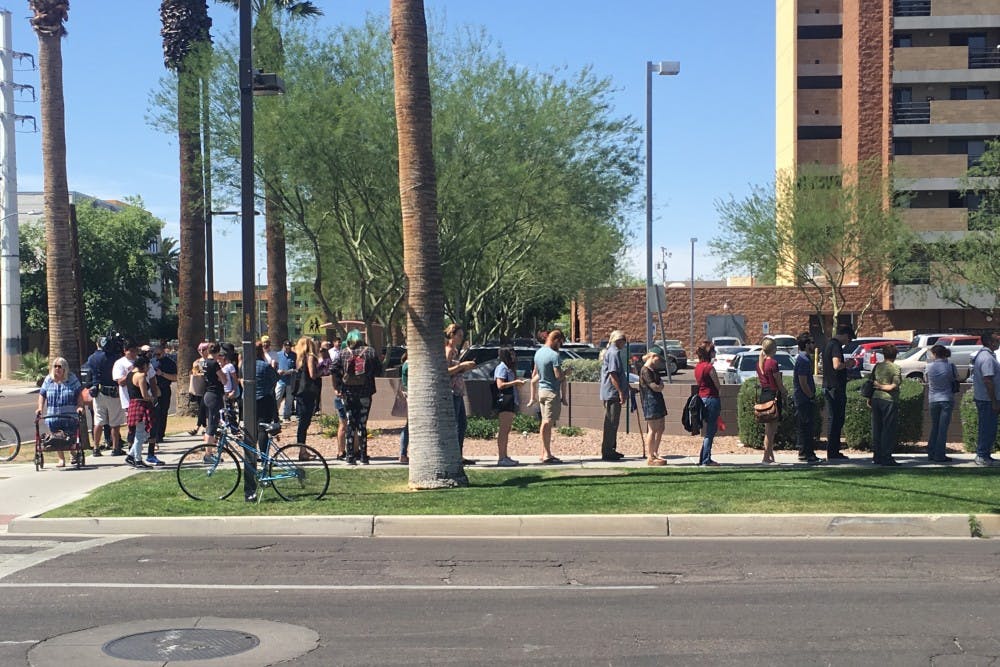The right to vote is the cornerstone of a democracy. Yet effectively, if someone has a right but is unable to practice it, this right is meaningless.
On Tuesday night in Arizona, Maricopa County sent a message to Arizona voters: Your vote is unimportant to us.
The polling stations recording votes in the Presidential Preference Election officially closed at 7 p.m. Yet at that time, hundreds of voters still remained in line outside polling stations, committed to exercise their right to vote. In downtown Phoenix, a voter waited more than five hours to finally cast her vote at 12:12 a.m.
Tony Cani, an employee at the City of Tempe and the founder of Inspire Arizona, an organization dedicated to empowering youth in civic engagement, counted 565 voters in line at the Arizona Historical Society Museum in Tempe around 20 minutes after polls closed.
Cani had stopped at the polling location to drop off his early ballot. But when he saw hundreds of people still waiting in line
— students, elderly people, moms with children — and no one there to encourage them to stay, answer questions or give out snacks or water, he ran to a grocery store and returned with 100 water bottles, one bag of Oreos, one bag of Chips Ahoy, 66 Dumdums and 68 Tootsie Pops. Cani had no trouble handing out the snacks and water he brought. His most grateful recipients were moms with young children.What Cani said troubled him the most about the scene from Tuesday night is that "voting is a habit and many people are first inspired to vote in a presidential primary."
Presidential primaries are exciting, and a positive experience casting a vote in a primary can encourage electoral participation in both subsequent presidential races and less high-profile elections.
Similarly, a negative voting experience in a presidential primary can have adverse effects on future civic participation. When you ask voters to stand in line for hours outside a polling place, even after the race has been officially called, the message is clear: Their vote is a formality. When you make it hard for voters to exercise their fundamental democratic rights, you weaken the incentives to do so and effectively weaken our national democracy.
Tuesday's long lines and the resulting disenfranchisement of hundreds of Arizona voters were the result of a conscious choice by Maricopa County. On Tuesday, Maricopa County had 60 polling locations. In 2012, there were slightly more than 200, and in 2008, there were 400. To put those numbers into context, only 15 percent of the stations open in 2008 were open on Tuesday.
Elizabeth Bartholomew, communications manager for the Maricopa County Recorder's Office, explained that reducing the number of polling stations "saves a lot of money ... and there are fewer people who vote." The Recorder's Office has also cited the increase in mail-in ballots over recent years as a justification for reducing polling locations.
In a Fox 10 interview, Maricopa County Recorder Helen Purcell blamed the long lines on "the voters, for getting in line." Although she was quick to backtrack on this statement, the admission of fault on the part of the County for not having adequate polling stations was secondary in the Recorder's distribution of blame.
The Recorder's eventual admission of fault, which came this morning, is too little too late.
The notion that in a democracy voters would ever be blamed for simply getting in line to cast their vote is outrageous. Even setting aside the issue of voter blame, Maricopa County had the responsibility to ensure that voters could access the polls. The voters who stood in line for hours to cast their votes deserve praise. Those who were discouraged by the process deserve an apology.
Cost-cutting is not justified when it comes at the expense of fundamental civil rights.
Tuesday needs to serve as a lesson for Maricopa County and election officials across the country. If our nation claims to take pride in its democracy, if we truly value the right to vote, assurance must be made that voters will be able to exercise that right. The existence of a right without the safeguard of its practice is meaningless.
Reach the columnist at maarmst7@asu.edu or follow @MiaAArmstrong on Twitter.
Editor’s note: The opinions presented in this column are the author’s and do not imply any endorsement from The State Press or its editors.
Want to join the conversation? Send an email to opiniondesk.statepress@gmail.com. Keep letters under 300 words and be sure to include your university affiliation. Anonymity will not be granted.
Like The State Press on Facebook and follow @statepress on Twitter.




